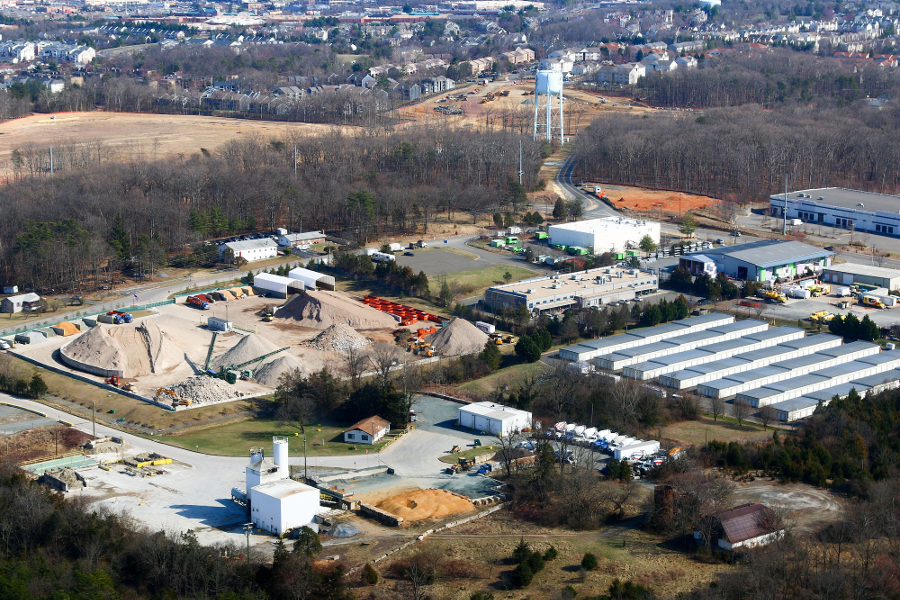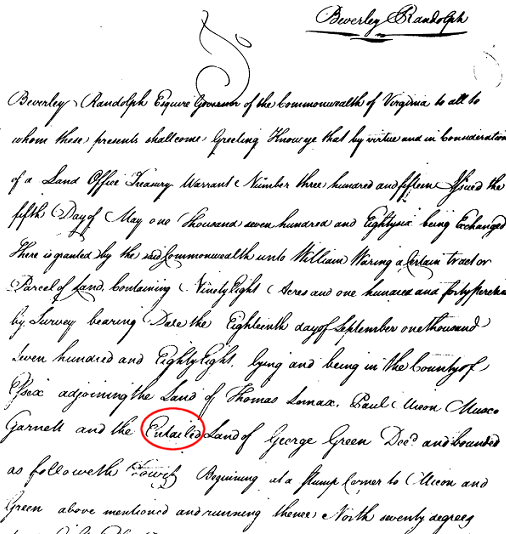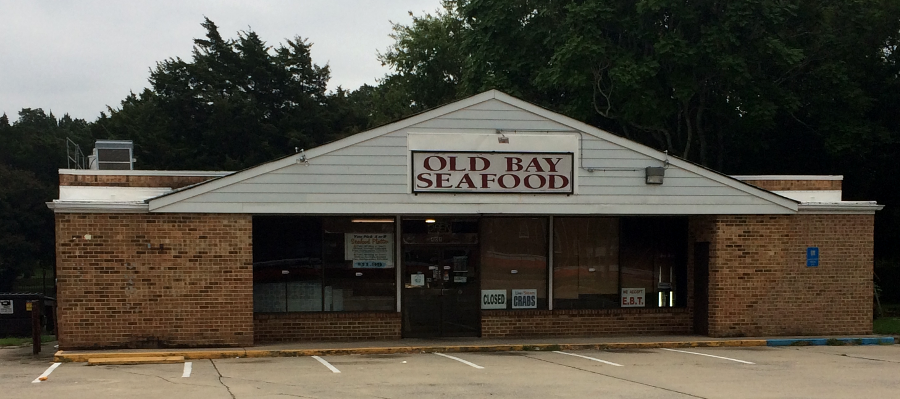
zoning is often used to separate industrial, residential, and commercial uses into different areas (zones)
Source: Historic Prince William, Farthing Park Rd. at Old Compton Rd. - #313

zoning is often used to separate industrial, residential, and commercial uses into different areas (zones)
Source: Historic Prince William, Farthing Park Rd. at Old Compton Rd. - #313
Property rights associated with a parcel of land can be perceived as a bundle of individual sticks. A homeowner can rent the house, allowing someone else the right to occupy the structure while retaining ownership of the property - and any appreciation of real estate value that might occur over the time of the lease. The owner may separately divest himself or herself of additional rights in separate transactions - allowing someone else to have a right-of-way to build a driveway along the edge of the property, or allowing a utility company to have a right-of-way for a power line.
Utility rights of way are often perpetual, but other rights may be granted for a fixed period of years. After the lease expires, the landowner regains control of the land. A landowner who leased out acreage along a highway for a gas station for 20 years may retain the buildings erected by the company that leased the land, or require that all improvements be removed and the land restored to its original condition when the 20-year lease expires.
Renting or selling some of the bundle of rights typically creates income to the property owner. Zoning is a legal limitation on the right to use property that provides no income.
The courts have determined that zoning that reduces land values without compensation to the landowner is legal, exercised as part of the "police power" of the local government. The Fifth Amendment to the US Constitution allows the government to take total control of property as well, but requires fair compensation to the landowner when there is a "taking" of private property for public use.
Limitations on land use by the government are not a new issue. Between 1607-1619, nearly all of colonial Virginia was owned by the London Company, based on their charter from the king... ignoring the claims of the Powhatans, of course. Private ownership of land by average colonists, including those who had served their terms of indenture, was permitted in the liberalization of company control in 1619. Sir George Yeardley replaced Thomas Dale and his martial law ("Lawes Divine, Morall and Martiall") by giving English immigrants more control over their life in Virginia - including a General Assembly elected by local residents - and a stronger economic incentive to stay in the colony.
Until 1776, Virginia remained a colony that followed English law. It allowed for "entail," where the landowner could control who would inherit the land and how future generations could resell it later. A constraint on future land sales by children, grandchildren, etc. could "keep the money in the family" and ensure that a productive farm would not be subdivided into small, uneconomic units in future generations.

1789 land grant in Essex County, adjoining the land of Thomas Lomax,
Paul Micou, Muscoe Garnett and the Entailed Land of George Green
Source: Library of Virginia
In the days of the American Revolution, entail (and "primogeniture," which steered the bulk of inheritances to oldest sons) were perceived as limits on liberty. In 1776 Thomas Jefferson engineered passage of legislation through the General Assembly that abolished entail in Virginia. (It took nine more years to abolish primogeniture, in 1785.) He made his point clear in a 1789 letter to James Madison: "I set out on this ground which I suppose to be self-evident: 'That the earth belongs in usufruct to the living;' that the dead have neither powers nor rights over it..."1
However, even today limits on property rights are challenged as "unAmerican..." In particular, landowners constrained from potential development by zoning restrictions often complain that their property rights have been seized without fair payment. In other circumstances, landowners also request local/state governments to "do something" once they discover a gas station, adult book store, or other undesirable development is planned for a parcel near their house.
The Supreme Court determined in 1926 that zoning is a legitimate exercise of the police power of government. The impact of that decision is that zoning is not a "taking" as defined by the Fifth Amendment, and local governments are not required to pay landowners for restricting development rights through zoning (provided some reasonable economic use is permitted).
Many cases since Village of Euclid, Ohio v. Ambler Realty Co in 1926 have clarified or muddled the boundaries between private property rights and the rights of the general public to control land use. In 2005, the Supreme Court (the Federal supreme court, not the state supreme court...) ruled in Kelo v. New London that local governments could seize land through the right of eminent domain to force the transfer of land from one private owner to another.
Even though the court ruled that the initial owner had to be compensated for the "taking" in accord with the Fifth Amendment, public reaction to the decision was strong. One member of the Virginia House of Delegates, Bob Marshall, said "Virginia, which led the American Revolution, has a special responsibility to right this wrong..."2
The state legislatures define the legitimate "public uses" for taking land through eminent domain. The Constitution of Virginia states:3
Unlike the Connecticut legislature, in Virginia local governments are not authorized to condemn property for economic development purposes. In Virginia, which governs according to the Dillon Rule, local governments have only the authorities granted to them by the General Assembly. The General Assembly has empowered local governments in Virginia to condemn property for roads, schools and other public uses, but local governments do not have the right to condemn property for economic development.
Virginia Beach clarified this limitation in 2000. The city tried to condemn private property on the oceanfront to help a Hilton Hotel build a parking garage, but Circuit Court Judge H. Thomas Padrick Jr. ruled that Virginia Beach could not use eminent domain for that purpose.4

a re-purposed 7-11 in Suffolk demonstrates that zoning controls whether a parcel is commercial, but not which business occupies it